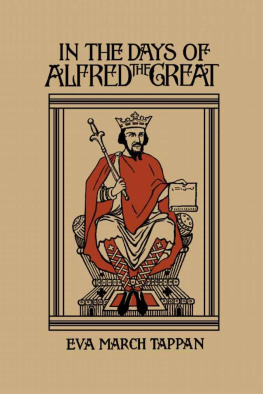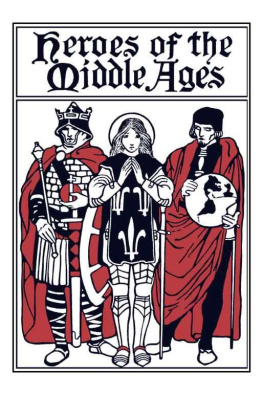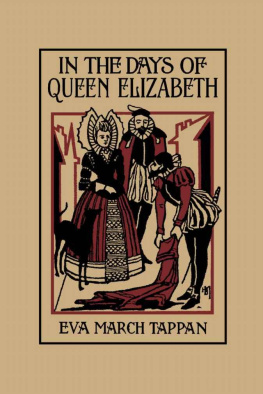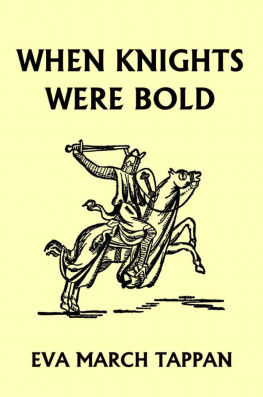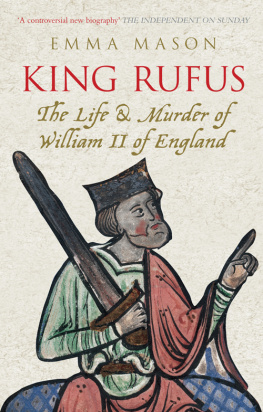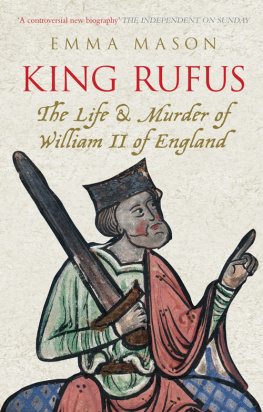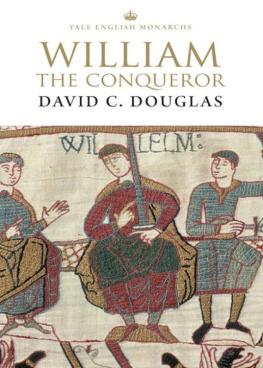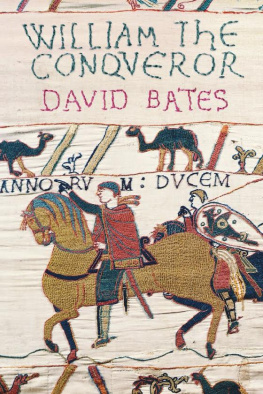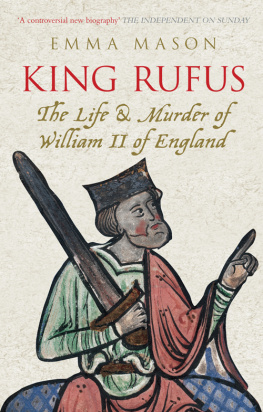Eva March Tappan - In the Days of William the Conqueror
Here you can read online Eva March Tappan - In the Days of William the Conqueror full text of the book (entire story) in english for free. Download pdf and epub, get meaning, cover and reviews about this ebook. year: 2006, publisher: Yesterdays Classics, genre: Art. Description of the work, (preface) as well as reviews are available. Best literature library LitArk.com created for fans of good reading and offers a wide selection of genres:
Romance novel
Science fiction
Adventure
Detective
Science
History
Home and family
Prose
Art
Politics
Computer
Non-fiction
Religion
Business
Children
Humor
Choose a favorite category and find really read worthwhile books. Enjoy immersion in the world of imagination, feel the emotions of the characters or learn something new for yourself, make an fascinating discovery.
- Book:In the Days of William the Conqueror
- Author:
- Publisher:Yesterdays Classics
- Genre:
- Year:2006
- Rating:3 / 5
- Favourites:Add to favourites
- Your mark:
- 60
- 1
- 2
- 3
- 4
- 5
In the Days of William the Conqueror: summary, description and annotation
We offer to read an annotation, description, summary or preface (depends on what the author of the book "In the Days of William the Conqueror" wrote himself). If you haven't found the necessary information about the book — write in the comments, we will try to find it.
In the Days of William the Conqueror — read online for free the complete book (whole text) full work
Below is the text of the book, divided by pages. System saving the place of the last page read, allows you to conveniently read the book "In the Days of William the Conqueror" online for free, without having to search again every time where you left off. Put a bookmark, and you can go to the page where you finished reading at any time.
Font size:
Interval:
Bookmark:
All rights reserved. No part of this book may be reproduced or retransmitted in any form or by any means without the written permission of the publisher.
This edition, first published in 2010 by Yesterday's Classics, an imprint of Yesterday's Classics, LLC, is an unabridged republication of the work originally published by Lee and Shepard in 1901. This title is available in a print edition (ISBN 978-1-59915-036-9).
Yesterday's Classics republishes classic books for children from the golden age of children's literature, the era from 1880 to 1920. Many of our titles are offered in high-quality paperback editions, with text cast in modern easy-to-read type for today's readers. The illustrations from the original volumes are included except in those few cases where the quality of the original images is too low to make their reproduction feasible. Unless specified otherwise, color illustrations in the original volumes are rendered in black and white in our print editions.
The story of William the Conqueror is the story of the man who for more than a quarter of a century was the most prominent personage of western Europe. Into whose hands shall England fall, was one of the two or three great questions of the time, and it was William who solved the problem.
Whether or not his claim to the English throne was just, the people and their new sovereign seemed made for each other. The English could follow; William could lead. The English could endure; William could strike the blow that made endurance needless. The English were inclined to be grave and serious; William enjoyed a jest. The English were a little slow in their thinking; William was quick-witted. The English would yield to fate; William was fate itself.
William's reign was a period of transition, and in such a time both faults and virtues stand out in bold relief. Whatever in the character of the Conqueror the twentieth century may find worthy of blame or of praise, no student of his life will deny that his faults were those of his time, that his virtues were his own.
E VA M ARCH T APPAN
WORCESTER, November, 1900
"C OME to the window, Ermenoldus. See how the country stretches out,fields and vineyards and corn land! There's no richer ground in the whole duchy of Normandy."
"You and Duke Richard rule it together, do you not, my lord?"
"No. We hold it together after a fashion, but he rules. I am his vassal. Hiesmes is mine, and this goodly castle of Falaise ought to go with it."
"Was the duke your father's favorite, my lord?"
"Doesn't it look like it, when he left me only Hiesmes and then cut off the best part of it for Richard?"
"Could it have been suggested to him, my lord?"
"You mean, did Richard tell him to do it," said Count Robert bluntly. "Who knows what one man has said to another? Richard was with him from morning till night. My father called him a 'good youth.' I suppose I was a bad one," and the young man laughed recklessly. "Anyway, Richard is Duke of Normandy, and I am only the Count of the Hiesmois; and here I am in the village of Falaise that ought to be mine, collecting taxes that ought to be mine, and putting them safely away for my brother in the treasure-room of the castle that ought to be mine."
"This castle seems to be of good strength, my lord. The walls are thick and heavy. It would not be easy to batter them down. It stands at the very edge of the cliff, and the cliff falls down sheer to the valley. No one could approach on that side."
"No; it's a strong castle, but I have none that could not be captured in a day. Come to the window again, Ermenoldus. See what a mass of rook the castle is built on, and how it juts out over the valley! Across the Ante is that other great, jagged precipice. You're a wizard, Ermenoldus; I verily believe you are. Couldn't you build me a castle on Mount Mirat yonder that would be as strong as this?"
I'm not enough of a wizard to give you a castle, my lord," said Ermenoldus; "and yet, there's more than one way," he half whispered. Count Robert did not hear the whisper, for he had turned again to the narrow window.
"If those girls are as pretty as they are graceful and merry," he said, "they would be well worth seeing. Ermenoldus, will you call some one to get my horse? or, if you stamp three times on the stone under your feet, won't the horse come of its own accord, all saddled and bridled?"
"You think too highly of the little that I have learned," said Ermenoldus.
"I'm not sure, though," said the count laughing, "but you are in league with the fiend himself and know all that there is to be known. Whence do you come and whither do you go? You appear and then you disappear, and all I know is that you are gone."
"Never did I go faster than you will go to gaze upon the pretty maidens washing linen on the banks of the stream," said Ermenoldus; "only I beg you, my lord, don't ride down over the cliff in your haste. All my magic could not save you then;" but Count Robert was already at the gate, and the next minute he was galloping down the rough, rocky way that led to the foot of the cliff.
The linen had been spread out on the grass to dry and to whiten in the hot sun, and the young girls were frolicking in the ripples of the little stream, laughing and splashing water at one another. One had bent down a green bough and held it in front of her face to protect it.
"By my faith!" said Count Robert to himself, "if that maiden's face is as fair as her little feet are white, she's prettier than all the high-born dames at my brother's castle." Just then the maiden let go the green branch and it sprang up above her head.
"Let's dance," she said, "not splash water at one another like children."
"That's a fairer face than I ever saw before," thought the count, as he stopped his horse, and hidden by the trees, gazed at the young girls in their playful imitation of the village dance, their white feet now twinkling in the green grass on the river's brink, and now splashing rainbow drops around them.
"See how high the sun is," said one of the girls. "The linen is dry, and we must go home."
"I'm tired. I'm going to rest awhile here under the trees before I go," said the maiden of the green branch.
"But the sun is almost overhead," said one girl. "Won't your mother beat you if you do not come?"
"Beat? What is that? No one ever beats me," she replied indifferently. "You carry the linen home for me, and I will come when I have had my little nap. Good-by, my friends," and she waved them a farewell as she sat on the bank with her head on her hand, half reclining on the soft green grass in the shadow of the trees.
"Well, if that isn't Arletta!" said one young girl. "She commands us to carry home her linen for her, and we obey. We always do just what she tells us to. Listen! Now she is singing. If I stayed after the washing was done to sleep on the bank and to sing songs, I should have a sound beating, but Arletta always does what she likes." The maidens went slowly down the valley. Arletta half closed her eyes, and sang softly to herself.
"And may I listen to the pretty song?" said a voice coming so suddenly that it seemed to be just at her ear. Arletta sprang to her feet and made a humble courtesy, and then stood still, too abashed to look up. The rider had dismounted and stood holding his hat with its long plume in one hand and the horse's bridle in the other.
Font size:
Interval:
Bookmark:
Similar books «In the Days of William the Conqueror»
Look at similar books to In the Days of William the Conqueror. We have selected literature similar in name and meaning in the hope of providing readers with more options to find new, interesting, not yet read works.
Discussion, reviews of the book In the Days of William the Conqueror and just readers' own opinions. Leave your comments, write what you think about the work, its meaning or the main characters. Specify what exactly you liked and what you didn't like, and why you think so.


